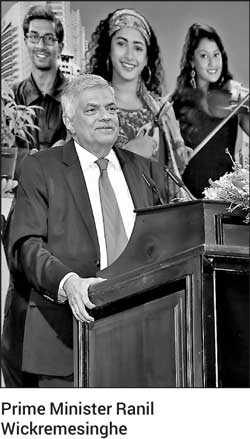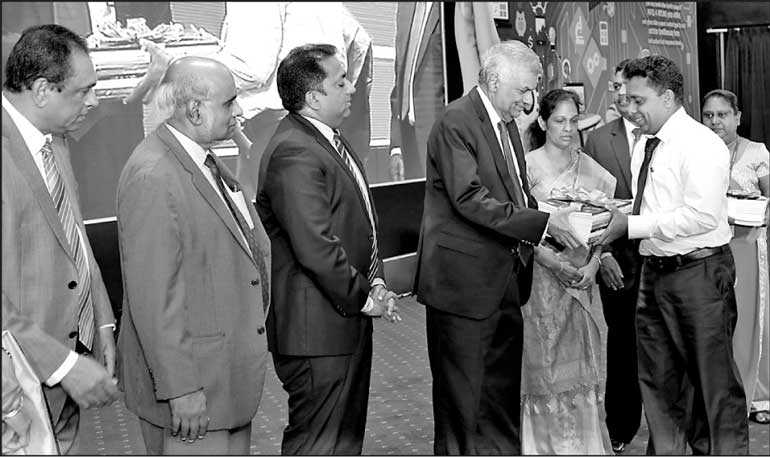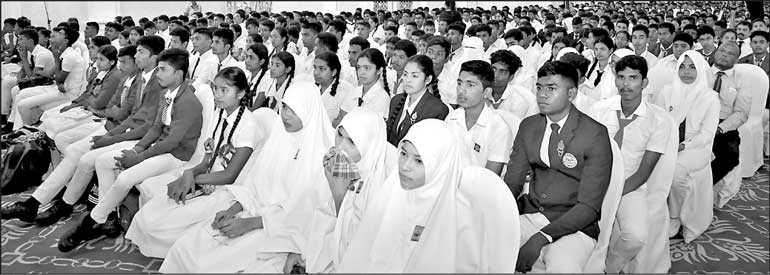Saturday Feb 21, 2026
Saturday Feb 21, 2026
Saturday, 23 February 2019 00:00 - - {{hitsCtrl.values.hits}}
 Prime Minister Ranil Wickremesinghe has said that Sri Lanka will be modernised with a revolutionary change in education.
Prime Minister Ranil Wickremesinghe has said that Sri Lanka will be modernised with a revolutionary change in education.
Participating at the launch of the National Education Program that ensures a 13-year education for every child at the Temple Trees on Thursday, the Premier said the education system of developed countries has been designed to fit the present day.
The Premier said the program will make 13 years of school education compulsory for every child in Sri Lanka, like in Japan, Korea, China and other developed countries, creating job opportunities and revenue streams to match the modern economy.
Expressing his views at the occasion, the Prime Minister said that Sri Lanka will be modernised through a revolutionary step in education to groom citizens to fit the needs of the society.
“Once upon a time, in the kings’ time, our main economic asset was the paddy cultivation in the dry zone. Subsequently our economic resources were cinnamon and spices. In the modern world today, the main asset is not agricultural commodities, spices, apparel or fishing. Our main resources today are human resources and our location in the Indian Ocean,” the Prime Minister said.
“In today’s developed countries of the world, the education system is designed to train students according to the needs of the current society. Not only university knowledge but also social knowledge should be given,” he said.
“What we start today is that revolution. For the first time now our country has recognised that 13 years of schooling is necessary,” he added.
The Premier noted that when free education began in Sri Lanka in the 1940s, the education level was high. However, today, the 13-year compulsory school system has been introduced in many countries such as Korea, Japan, China, Thailand, Malaysia, Singapore and Indonesia.
“Although the free education system has been executed in Sri Lanka, 50% of the students drop out due to our education system. Therefore, we have implemented this massive program to change the situation.”
The Premier pointed out that to prepare the background for the 13-year program, the Government first provided necessary assistance to schools where, under Education Minister Akila Viraj Kariyawasam, the ‘Nearest School is the Best School’ program and the Suraksha student insurance scheme were launched.
“Our primary objective was to provide higher education for everyone,” he said.
“To develop a country, we need professors as well as cricket players who can win matches. We cannot be satisfied only with professors or the presence of universities. We should have hope in cricket matches as well,” the Premier said. He said the country today needs about 300,000 graduates who have technical knowledge. But today we have only about 100,000 people. If the service of these 300,000 can be obtained, it will be easy to repay the debt and the country can raise another Rs. 2-3 billion in income, he pointed out.
“As the knowledge in the agricultural sector increases, production increases, the competition will increase and prices will come down. Every sector will be developed this way. That’s why we introduced the new program,” he added.
The Prime Minister said the finest education system in the world exists in Finland. Every student in that country studies for 13 years. They believe that not all children need to go to the universities, and they are working to direct the students to various fields.
The Education Minister took the responsibility to implement that system in Sri Lanka and the 13-year program was initiated with the collaboration of Finland. Under the first stage, 800 schools have been selected to implement the program in.
During the 13 years of education, all students will get an opportunity to receive professional education through the subjects introduced via this educational program.Twenty-six subjects have been introduced under seven educational fields; Health and Social Services, Creative, Technical Study, Social Cultural Education, Agro and Food Technology, Tourism and Hospitality Services, and Environment-Related Study.
Nearly 300,000 students sit for the GCE Ordinary Level Examination and 100,000 of them do not receive an opportunity to advance to higher education.
Such children will get an opportunity to select subjects under the 13-year educational program to meet vocational qualifications. This will also give them local and foreign educational opportunities.
Minister of Education Akila Viraj Kariyawasam, State Minister of Education Vijayakala Maheswaran, and a large number of Ministers also participated in this event organised by the Education Ministry.The presentation of the modules of vocational curriculum to 10 schools also took place under the patronage of Prime Minister Wickremesinghe.

